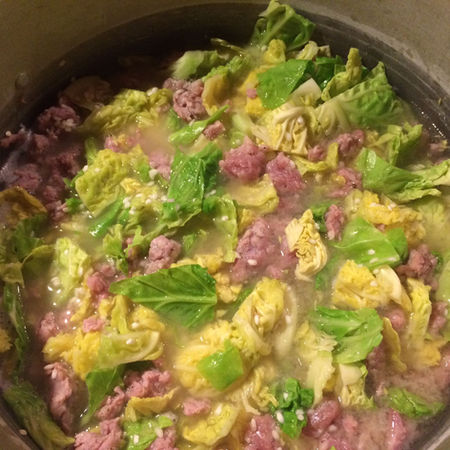“A la fìn te ghe de méter an pistadí de ai e perdesel”.
”Le sigule le va mai sufrite, ma morbid, te le fé mörer”.
“I consigli della zia Rina, nel suo forte dialetto bresciano, mi risuonano ancora in testa mentre preparo un battuto, mentre soffriggo le cipolle, accorgimenti minimi, dettagli che peró fanno la differenza, ti possono cambiare il piatto”. Pierangelo viene da una lunga tradizione familiare di devoti alla cucina: “C’era un tocco, una mano nella cucina di mia zia Rina come in quella di mio nonno Angilín (Angelo) che tutti riconoscevano”.
È cresciuto in una trattoria, ai 4Venti di Curtatone, dove poi ha a lungo lavorato come cuoco prima di prendere una strada del tutto indipendente: “C’era, allora – ricorda - un vero e piccolo esercito familiare intorno ai fornelli: nonni zii cugini, una passione che accomunava un intero ramo della
famiglia, quello materno. L’altro ramo professava invece l’agricoltura e io credo di essere arrivato a una buona sintesi tra queste due attitudini”, scherza il cuoco contadino.
“Nella nostra famiglia hanno sempre cucinato tutti, uomini donne bambini…Ho profumi e sapori impressi per sempre nel mio cervello. Ricordo quando a settembre si preparavano i peperoni verdi sottaceto, ricordo i colori della giardiniera e l’aceto della catalogna che anestetizzava le
labbra. Gli agnolini sono ancora una sfida aperta con quelli che preparava mia nonna. Ho tutto in testa, e ogni volta sono a un pelo da raggiungere quel risultato ma ogni volta mi sfugge. Chissà che un giorno anche i miei nipoti non possano dire altrettanto. Lo stesso quando preparo il pesto per il risotto col puntel. Ho sempre in mente quello di Angilin, che era anche un masalin (un norcino). Mezzadro alla Mainolda, prima di essere cuoco ai 4Venti, andava di corte in corte ad ammazzare maiali e far su salami. Il gusto per i buoni salumi fa parte del nostro dna e i profumi di spezie della
concia sono il mio personale metro di giudizio di un buon pesto”.


















